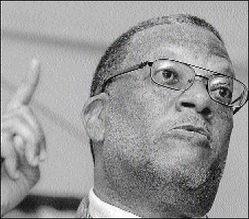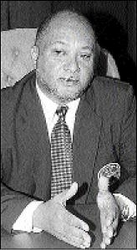Hit them where it hurts! Former national security minister urges Government to utilise the powers of the POCA to strip high-profiling criminals of their wealth
Published: Sunday | October 4, 2009


Phillips (left) and Reece
Tyrone Reid, Sunday Gleaner Reporter
Former Minister of National Security, Dr Peter Phillips, is urging the government to launch a systematic campaign to identify the major players in organised crime in the country, drag them before the courts and strip them of their wealth.
According to Phillips, by utilising the powers contained in the Proceeds of Crime Act (POCA), the government can hit the criminals hard.
He pointed out that the act provides for "civil forfeiture of property where you can demonstrate a criminal lifestyle ... (if) the assets held don't have any legitimate source of origin".
So, if Phillips has his way, the panache long associated with criminality would be put under the microscope, with the owners of lavish mansions and posh cars being targeted.
"To make the dent in this particular respect is really going to require a sustained and logical sequence to identify your major figures of organised crime and to decide to use the act," Phillips said in an interview with The Sunday Gleaner.
Effective utilisation
He argued that the effective utilisation of the POCA demands the preservation of international partnerships.
"It is also going to require that you work closely with your international partners, with forensic accounting, and the tracing of property, even into foreign jurisdictions. That also requires will and, of course, those partnerships are two-way partnerships," he said.
Dr Phillips only had the POCA at his disposal, as national security minister, for some four months, but argues that during his tenure, people were sent for training, and the powers of the act were used in a couple of cases.
He also argued that his administration was at the point of appointing additional staff when the 2007 general election was called.
Now Phillips does not believe the law is being used adequately.
However, Major Richard Reece, permanent secretary in the Ministry of National Security, said an operation of that nature is part of the ministry's thrust.
Reece, who would not go in detail due to security concerns, said the operation in question spans several entities, including the Financial Investigations Division and the Jamaica Customs Department.
"... Usually, you don't speak about these operations until you have acted.
"What we have is a multi-agency task force that addresses the issue of proceeds of crime and organised crime and it will cover the entire range from lotto scam (to) illicit financial schemes - the whole gamut," Reece said.
He explained that the multi-agency approach is necessary because it is sometimes difficult to get certain criminal charges to stick on some offenders.
"It is becoming increasingly joined up, in terms of our approach. Usually, if you can't apprehend the person in terms of, maybe, narcotics trafficking, you can get them on, maybe, tax evasion under the Proceeds of Crime (act)," Reece said.
Lengthy preparation
But George Soutar, attorney-at-law and president of the Advocates' Association of Jamaica, told The Sunday Gleaner that cases brought before the court under the POCA tend to be time-consuming.
"I don't know that there are many matters completed so far (under the POCA). It's a new law and the cases take time to prepare," he said.
Soutar explained that tracing financial transactions and obtaining documents capable of being admitted in evidence are all part of the lengthy preparation process required in cases brought before the court under the POCA, which was passed into law on the last day of May 2007.
Two of Soutar's clients have been charged with criminal offences under the POCA. The cases, which started a few months ago, are still before the courts.
He believes time and cases will test the mettle of the legislation passed by the nation's lawmakers. "It is going to be tested by the courts. Its inadequacies or otherwise will certainly be explored in the courts," Soutar said.









